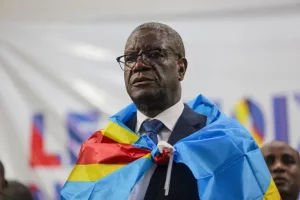The outgoing President of the Democratic Republic of Congo, Félix Tshisekedi, 60, who took office in 2019, is a favourite to win a second term in these presidential elections.
According to an opinion poll, Tshisekedi is expected to win, securing 49.3% of the vote. His closest rival, businessman Moise Katumbi, is expected to obtain 28.1% of the vote.
Running for a second five-year term, Tshisekedi became the President of the Democratic Republic of the Congo on January 24, 2019, after winning the presidential election held in December 2018. He is currently running for a second term in office in the presidential election held yesterday, Wednesday, December 20, 2023 against 19 other contenders.
About 44 million Congolese, out of 111 million, registered to vote. More than 100,000 candidates are running for various positions, and while counting was due to begin as soon as polling stations closed, results are not expected to be announced for several days.
Front-runner Tshisekedi’s campaign has been focused on restoring security in the east of the country, which has been affected by conflict and violence. However, the opposition has accused Tshisekedi of failing to address the security situation in the east, and they have proposed a common candidate, Moise Katumbi, to run against him.
Despite these challenges, Tshisekedi remains a strong contender in the election, according to reports, but the final result will depend on the outcome of the ongoing voting process and the response to the various issues faced during the election.
A grouping of independent radio stations in the DRC, Studio Hirondelle RDC, reported that there were angry crowds at polling stations in several parts of the country because of long queues.
The problems, according to Hirondelle RDC, were thought to have been caused by delays in delivering voting materials to polling stations, some not having voter registration lists, and experiencing problems with poor-quality voter ID cards where the ink had faded, making names and pictures unclear.
Dr Denis Mukwege, who won the 2018 Nobel Peace Prize for his work treating survivors of rape, shared with journalists how he was worried about the multiplication of serious malfunctions and irregularities in the current election, confirming fears of obviously planned electoral fraud.
Mukwege said that there had been reports of voting machines not being delivered, voters not being able to find their names on voting lists, observers being blocked, and some cases of people being told how to vote.

“We fear that the results of such a chaotic vote will not reflect the will of the people and their deep desire for change,” Mukwege said.
Additionally, Studio Hirondelle RDC reported that displaced people who discovered they were unable to vote the day before the election attacked a polling station in the Ituri province.
Ituri hosts many of the residents displaced in the eastern DRC, where the Rwanda-backed M23 rebels launched a new rebellion against the government in 2022.
The delays and irregularities have raised concerns about the credibility of the election, with opposition candidates and civil society observers expressing alarm.
